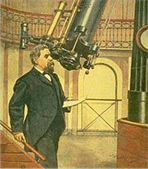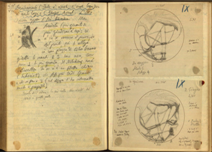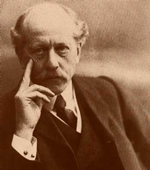

Giovanni Virginio Schiaparelli
Explorator of new worlds on the centenary of his death
-- Life --
Explorator of new worlds on the centenary of his death
-- Life --
 Life and works
Life and works-
Giovanni Virginio Schiaparelli was born at Savigliano (Cuneo) on the
14th of march 1835 and died at Milano on the 4th of july 1910.
He was a world famous astronomer, with a broad range of scientific and cultural interests, including history of astronomy. G. V. Schiaparelli on a cover of the italian newspaper "Domenica del Corriere"
G. V. Schiaparelli on a cover of the italian newspaper "Domenica del Corriere"
At the age of 19 he graduated with honours as a hydraulic engineer and civil architect at the University of Turin.
However he was very interested in astronomy, and, through some influential friends (e.g. Q. Sella, L. Menabrea), he obtained financial support from the Government to pursue his astronomical studies abroad.
In 1857 Schiaparelli went to Berlin where he studied with Encke, and then in 1859 to the observatory of Pulkovo in Russia.
There he remained for twelve months in what was perhaps the best school in astronomical observation and calculation.
In november 1859 he received the appointment of second astronomer to the Brera Observatory, and in 1862 he was appointed Director.
From june 1860 till his death, Milan was the scene of all his astronomical activity, for forty years at the Observatory and for ten years after his retiremente at his residence.
His first discovery was the minor planet Hesperia, in 1861, followed in 1886 by the discovery of a connection between the orbits of comets and meteors (for which he was awarded he Gold Medal of the Royal Astronomical Society in 1872). A diary with G. V. Schiaparelli’s observations of Mars
A diary with G. V. Schiaparelli’s observations of Mars
With a new refractor telescope "Merz" of 22 cm of 22 cm he begun in 1875 the measurements of double stars. Two years later, thanks to the excellent quality of the optics of the instrument, he started his long series of observations of the planets.
During Mars opposition in 1877, Schiaparelli began the long, important series of observations which he continued until the opposition of 1897, and which together formed the most complete monograph of the physical appearance of the planet of his times.
All observations together form the most complete monograph of the physical appearance of the planet of his times. Most of them were published in seven memoirs by the Reale Accademia dei Lincei.
The diaries with his drawings and annotations are preserved in the Archivio of the Brera Observatory, along with the correspondence with Percival Lowell, the american amateur astronomer that was the founder in 1894 of the famous astronomical observatory at Flagstaff (Arizona).In 1878 the italian Parliament and the king Umberto approved the fundings for a new large refractor of 49 cm (Merz - Repsold) that was installed in 1885 in the rebuilded large dome of the Brera Observatory. Portrait of Percival Powell
Portrait of Percival Powell
With this telescope he continued the observations of double stars and of planets.
His determination of the rotation period of Mercury was considered valid until the sixties of the past century, when the use of new techniques allowed a better estimate.
He gave many contributions for the advancement of knowledge.
The publications of the Brera Observatory bear witness to his researches in the astronomy of the Greeks.
After his retirement, Schiaparelli devoted much time to the study of Babylonian Astronomy: treatises on the origin and progress of astronomy with the Babylonians, and the astronomy in the Old Testament are among his latest publications.
However he could not complete his project of a history of astronomy, and several unpublished notes were printed along with the published papers in the three volumes of the Scritti sulla Storia dell'Astronomia Antica (1925-1927).
"An insatiable thirst for knowledge, a vigour of intellect that knew no inactivity, a versatility without apparent limit - these were the characteristics that actuated him throughout his life, and which enabled him to accomplish so much for the advancement of astronomy that he must ever hold an illustrious place in the annals of the science" (1911, Monthly Not. Roy. Astron. Soc., Vol. 71, p. 4).
-
Giovanni Virginio Schiaparelli was born at Savigliano (Cuneo) on the
14th of march 1835 and died at Milano on the 4th of july 1910.



